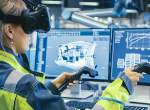Artificial intelligence and DevOps share a covalent bond, where the latter is business-driven and enables quality software while the former enhances the overall system functionality. The DevOps team can leverage artificial intelligence for testing, coding, monitoring, improving, and releasing the system. Moreover, AI helps improve the process driven by DevOps efficiently. Assessing the importance of AI in DevOps is beneficial from the perspective of developers’ utility and business support.
By 2023-end, nearly two-fifth of DevOps teams from organizations across the globe will use infrastructure and application monitoring tools integrated with artificial intelligence, estimates Gartner. Machine learning/artificial intelligence is the way to go for a dramatic improvement in the DevOps environment. For instance, AI helps manage complicated data pipelines and build data models to integrate with application development. However, a few obstacles stand in the way of businesses implementing ML and AI for DevOps, which demands a bespoke DevOps suite to benefit from these technologies.
How Does Artificial Intelligence Help DevOps Transform?
By making IT operations more responsive and streamlining DevOps processes, a business can improve the ROI using ML and AI. It also helps them enhance the productivity and efficiency of their team in bridging the gap between people and data. ML and AI are witnessing a foray into IT processes as organizations focus more on being data-driven. Blending ML and AI with DevOps has
- Made DevOps a critical aspect of digital transformation
- Enabled efficient workflows
- Hardened security for application development
Finding vital risks by scanning large volumes of data at speed comes easy with artificial intelligence and enables reducing time and human efforts significantly. To completely mitigate the chances of misconfigurations or faults, ML and AI can help by automating security operations. In addition, it helps make improvisations for eliminating potential data breaches and downtime wherever the attacker has the scope of exploiting vulnerabilities. Furthermore, the analysis and decision-making processes become data-driven with the help of ML and AI.
Key Ways in Which AI Transforms DevOps
The future of DevOps revolves around AI, which will drive managing voluminous computation and data in daily business operations. Following are some ways in which artificial intelligence influences DevOps and helps it evolve.
High Data Accessibility
A challenge for the DevOps teams is the barrier of unlimited data access. Artificial intelligence addresses this through cautious data transmission from the storage to the right destination. AI prepares the data gathered from different sources for a complete and accurate analysis, thereby providing valuable insights.
Resource Effectiveness
There are numerous repetitive operations that demand regular maintenance. AI-led automation tools can significantly increase the performance and accuracy of these operations. AI offers the imperative expertise for automating repetitive and routine processes. It removes the complexity and improves the effectiveness of the resources deployed.
Agile Implementation
Developing self-governing systems is made easy with AI. It enables agile implementation of DevOps by facilitating the shift from the rules-based management structure and removing the complexity of keeping track of human resources. Businesses can perform numerous tasks with zero or minimal human intervention and coding, concentrating more on innovation.
Augmented Security
AI in DevOps makes good sense for security as it enables organizations to react proactively to vulnerabilities. As security is a crucial driver for seamless software implementations, having DevSecOps as a fundamental component of software development significantly bolsters the system’s security. AI, playing a vital role, enhances DevSecOps by tracking threats and orchestrating ML-led anomalies using a central logging architecture. AI in DevOps can help businesses maximize their performance while preventing potential thefts and breaches.
Improved System Monitoring
Most organizations depend on monitoring tools and software to track infrastructure operations. While these tools and software show threat actors and vulnerabilities, they fail to give insights into what works perfectly for the infrastructure. AI becomes a boon here, enabling continuous monitoring of systems and navigating issues even when active monitoring is not in place.
Proactive Strategy Building
Predictive analytics is all about using mathematical models and historical data to gauge future trends based on past events and with high accuracy. AI powers predictive analytics in a way to forecast demand, estimate the lifetime value of customers, and identify potent markets and customers to make strategies proactively for boosting the business.
Informed Decision-Making
Making better decisions using recommendation engines delivers a touch of personalization that appeals to customer preferences. Powered by AI, recommendation engines get compatible with numerous business use cases, such as product marketing, customer relationship management (CRM), and lead generation.
Improved Customer Service and Experience
AI-driven chatbots use algorithms to simulate conversations with a human touch, which are feasible for businesses to respond to support requests. It helps them deal with repetitive questions without actual human intervention. For making this customer service more effective, intelligent automation solutions using AI come in handy for boosting customer experience through personalized interactions.
The Future of AI in DevOps
- Automated Continuous Integration/Continuous Deployment (CI/CD): AI is poised to significantly enhance CI/CD processes by automating build, test, and deployment phases, leading to faster and more reliable software releases.
- Predictive Analytics for Proactive Issue Resolution: The integration of AI-driven predictive analytics allows DevOps teams to foresee potential issues, enabling proactive measures and minimizing disruptions in the software development lifecycle.
- Smart Monitoring and Root Cause Analysis: AI-powered monitoring tools can intelligently detect anomalies, analyze patterns, and perform root cause analysis, enhancing the ability to identify and address issues promptly.
- Intelligent Resource Management: AI algorithms can optimize resource allocation by dynamically adjusting infrastructure capacity based on real-time demand, ensuring efficient utilization of computing resources.
- Automated Incident Response: AI-driven incident response systems can automate the identification and resolution of common issues, reducing manual intervention and minimizing downtime.
- Enhanced Collaboration with ChatOps: AI-driven ChatOps tools facilitate seamless collaboration among DevOps teams, providing real-time insights, alerts, and automating routine communication for improved efficiency.
- Self-Healing Systems: AI can enable self-healing systems that automatically detect and rectify certain types of issues without human intervention, ensuring greater system reliability and uptime.
- Optimized Test Automation: AI enhances test automation by intelligently selecting and prioritizing test cases, reducing testing cycles and providing faster feedback to developers.
- Intelligent Release Orchestration: AI can optimize the release orchestration process by predicting the impact of changes, ensuring smoother and more reliable software deployments.
- Continuous Learning and Improvement: Machine learning in DevOps allows systems to learn from historical data, user behaviour, and performance metrics, leading to continuous improvements in processes and decision-making.
To Conclude
Integrating AI with DevOps is evident in the near future, if not now. The DevOps model, without a doubt, benefits increasingly from artificial intelligence in the form of continuous planning, continuous integration, continuous testing, continuous deployment, and continuous monitoring. AI promises to lift the spirits of DevOps by eliminating system errors and human errors while enabling businesses to realize building self-learning, autonomous, and flexible systems.
FAQs
| What is the scope of AI in DevOps? |
| AI in DevOps supercharges automation, improves predictions to prevent issues, and optimizes workflows for faster, more reliable software delivery. |
| Will AI take over DevOps? |
| AI is unlikely to replace DevOps entirely. It will likely become a powerful tool for DevOps professionals, automating tasks and enhancing decision-making. |
| How can AI help in DevOps? |
| AI in DevOps automates tasks like testing and infrastructure management, freeing up DevOps teams for strategic work and improving software quality. |
| How do I use Gen AI in DevOps? |
| Generative AI in DevOps can automate code generation (boilerplate, scripts) and analyze logs for troubleshooting, making development and maintenance faster. |























